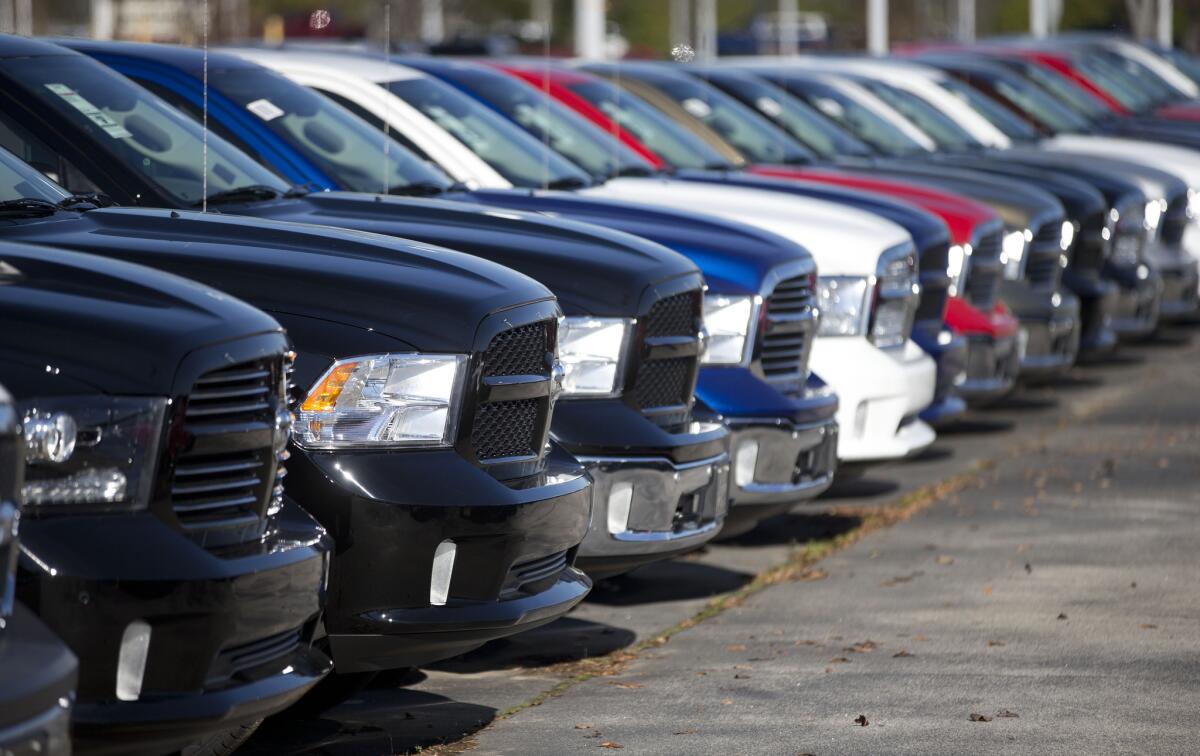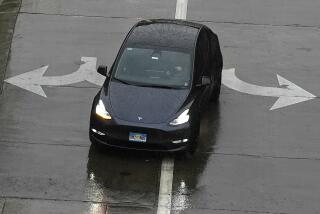EPA report shows backsliding on auto fuel economy and emissions, critics say

The Environmental Protection Agency reports that fuel economy numbers did not advance for the 2014 model year, probably because American vehicle buyers leaned more heavily toward gas-guzzling trucks than fuel-sipping sedans. Shown, Dodge pickup trucks on display at a dealership in Morrow, Ga., on Jan. 5, 2015.
U.S. automakers’ progress toward better fuel economy and emissions standards is slowing, a report from the U.S. Environmental Protection Agency shows.
The study shows scant improvement in either area. Average fuel economy for U.S. passenger vehicles in 2014 remained unchanged from the previous year: 24.3 miles per gallon — while average carbon dioxide emissions were also the same: 366 grams per mile.
The agency said the flat industrywide numbers masked mileage and emissions gains in every category, from cars to sport utility vehicles to trucks.
Consumers “bought a different mix of vehicles,” opting for heavier, larger and more powerful transportation, including more trucks and SUVs and fewer passenger cars, according to the EPA.
Despite that, Christopher Grundler, director of the EPA’s Office of Transportation and Air Quality, said automakers were to be applauded for reducing greenhouse gas emissions.
“For the third year in a row, manufacturers have exceeded the GHG emissions standards by a wide margin,” Grundler said.
The numbers end a yearslong trend of statistical progress toward the government’s stated goal of an average 54.5 mpg by 2025. The EPA’s report shows fuel economy rose in an almost unbroken line from 19.3 mpg in 2004 to the current level, with one small blip downward in 2011.
But critics said the report represented backsliding on the part of automakers and auto consumers.
Dan Becker, director of Safe Climate Campaign, said the 2014 totals demonstrate that car companies are taking advantage of government rules that allow weaker fuel and emissions standards for SUVs, trucks and larger vehicles, and selling more of those vehicles to consumers.
“The auto industry is exploiting the program’s loopholes to boost gas-guzzler production and thwart the rules,” Becker said. “There should be one fleet-wide standard that includes all cars and all light trucks.”
The EPA report shows that the 15.5 million passenger vehicles sold in 2014 were on average heavier and larger, and produced more horsepower, than those sold in 2013.
That’s in part because more of them were SUVs and trucks.
About 40% of new vehicles sold to U.S. consumers in 2014 fell into those categories, up from 35% in 2013 and only 19% when the EPA began tabulating such numbers in 1975.
“The biggest factor is that the carmakers have been producing more trucks than cars and larger cars,” Becker said.
Another factor: lower gas prices, which analysts said encourage consumers to favor heavier, faster vehicles that use more fuel.
Despite the flattening curve, the new EPA numbers drew applause from some sectors.
“Manufacturers are not just meeting, but exceeding, the emission standards,” said David Cooke of the Union of Concerned Scientists. “The fuel economy and emissions standards are working.”
Cooke acknowledged that more Americans are choosing SUVs and trucks but noted that automakers have improved overall fuel economy by 10% over the last decade.
Otherwise, said Don Anair, a Union of Concerned Scientists analyst, “We would have seen average overall fuel economy declining.”
By brand, Mazda claimed the highest marks, with an average 29.4 mpg. Trailing slightly were Subaru, Hyundai, Honda, Nissan, BMW, Kia and Toyota.
U.S. brands Ford, GM and Fiat Chrysler represented the bottom of the pile. Fiat Chrysler’s overall fuel economy number was 20.8 mpg, almost 9 mpg less than Mazda’s.
At this time last year, the EPA’s report on 2013 fuel economy and emissions represented all-time records, with numbers that had improved in eight of nine preceding years.
The model year 2013 fuel economy improved by a half-mile per gallon from 2012, and 20% over 2004 averages.
Over the same period, average carbon dioxide emissions for light-duty
gasoline and diesel vehicles was 369 grams per mile, 7 grams per mile less than 2012, last year’s EPA report said.
The EPA projects that average carbon dioxide emissions should fall to 360 grams per mile in 2015, the study said, while average fuel economy should rise to 24.7 mpg.







